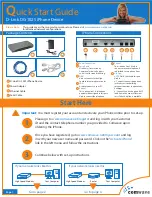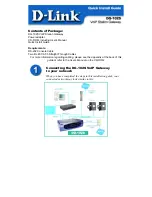
All nodes in the cluster must be members of the same domain and be able to
access a PDC and a DNS server.
1. Right-click
My Computer
, and click
Properties
.
2. Click
Network Identification
. The System Properties dialog box displays the full
computer name and workgroup or domain.
3. Click
Properties
and perform these steps to join a domain:
a. Select the
Domain
radio button.
b. Type the name of your domain and click
OK
.
c. When prompted, enter the Administrator user ID and password and click
OK
.
4. Close the
System Properties
window.
5. Restart the node, and proceed with “Cluster setup” on page 39.
After the computer restarts, it is recommended that you do not log on to the
domain. If you do, you will see the Windows 2000 Configure Your Server
window. Click the
I will configure this server later
radio button, and then click
the
Next
button. On the next window, clear the
Show this screen at startup
check box and click
Finish
.
Creating an Active Directory Domain
The Windows 2000 Cluster service runs in the context of a Windows-based domain
security policy, typically created specifically for the Cluster service to use. For the
Cluster service to form a cluster on a given node, the service must first authenticate
itself using the credentials of this policy. A domain controller must be available for
the domain that issued the policy for authentication to occur. If the Cluster service
does not have access to a domain controller, it cannot form a cluster.
Note:
For Active Directory to function properly, DNS servers must provide support
for Service Location (SRV) resource records described in RFC 2052,
A DNS
RR for specifying the location of services (DNS SRV)
. SRV resource records
map the name of a service to the name of a server offering that service.
Active Directory clients and domain controllers use SRV records to
determine the IP addresses of domain controllers. Although not a technical
requirement of Active Directory, it is highly recommended that DNS servers
provide support for DNS dynamic updates described in RFC 2136,
Observations on the use of Components of the Class A Address Space
within the Internet
.
The Windows 2000 DNS service provides support for both SRV records and
dynamic updates. If a non-Windows 2000 DNS server is being used, verify that it at
least supports the SRV resource record. If not, it must be upgraded to a version
that does support the use of the SRV resource record. A DNS server that supports
SRV records but does not support dynamic update must be updated with the
contents of the Netlogon.dns file created by the Active Directory Installation wizard
while promoting a Windows 2000 Server to a domain controller.
By default, the Active Directory Installation wizard attempts to locate an authoritative
DNS server for the domain being configured from its list of configured DNS servers
that will accept a dynamic update of an SRV resource record. If found, all the
appropriate records for the domain controller are automatically registered with the
DNS server after the domain controller is restarted.
If a DNS server that can accept dynamic updates is not found, either because the
DNS server does not support dynamic updates or because dynamic updates are
Chapter 5. Completing networking, clustering, and storage access setup
37
Summary of Contents for TotalStorage NAS 300
Page 1: ...TotalStorage NAS Gateway 300 Model G27 User s Reference GA27 4321 00...
Page 8: ...viii NAS Gateway 300 User s Reference...
Page 10: ...x NAS Gateway 300 User s Reference...
Page 14: ...xiv NAS Gateway 300 User s Reference...
Page 26: ...12 NAS Gateway 300 User s Reference...
Page 40: ...26 NAS Gateway 300 User s Reference...
Page 46: ...32 NAS Gateway 300 User s Reference...
Page 68: ...54 NAS Gateway 300 User s Reference...
Page 134: ...120 NAS Gateway 300 User s Reference...
Page 136: ...122 NAS Gateway 300 User s Reference...
Page 168: ...154 NAS Gateway 300 User s Reference...
Page 182: ...168 NAS Gateway 300 User s Reference...
Page 199: ......
Page 200: ...Printed in U S A GA27 4321 00...
















































